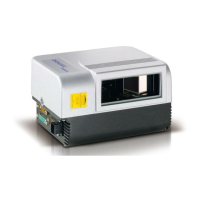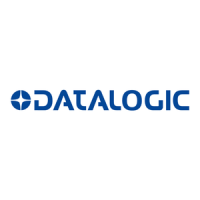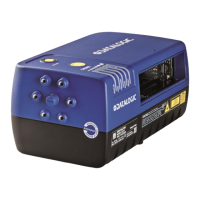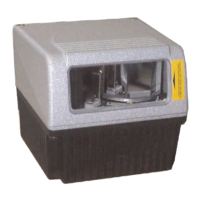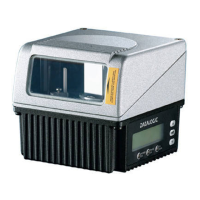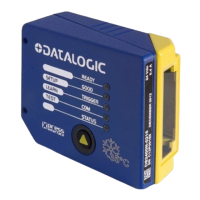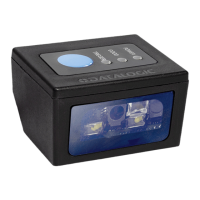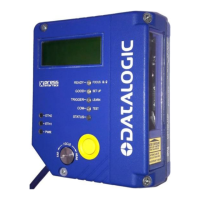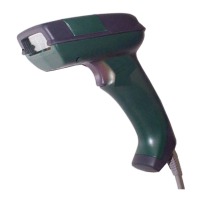Do you have a question about the Datalogic DS8100 and is the answer not in the manual?
Lists documentation related to DS8110 management, including connection box and controller manuals.
Provides information on accessing Datalogic's website for support, data sheets, manuals, and utilities.
Lists Datalogic patents related to the product and provides a link to the patent list.
Explains symbols for notes, warnings, high voltage, laser caution, and ESD caution.
States conformity with EN 60950 for electrical safety.
Provides compliance information for international authorities regarding laser use.
Details laser diode use, eye safety precautions, and Class 2 laser classification.
Mentions self-declaration for conformity to IS 13252.
Explains the warning label indicating laser light exposure and device classification.
States product intended for qualified personnel and UL/CSA certified power sources.
Displays CSA certification mark and related compliance statements.
Explains CE marking, essential requirements, and system integrator responsibility for risk assessment.
Mentions CU Conformity certification and Eurasian Mark.
Details FCC compliance rules for Class A digital devices and potential interference.
Introduces the DS8110 scanner's features and design for omnidirectional reading applications.
Provides a diagram and labels for the DS8110 scanner's components and ports.
Lists industrial applications and scenarios where the DS8110 excels, like code reconstruction and reading difficult codes.
Explains key features and technologies of the DS8110, such as DST, ACR, PACKTRACK, and e-Genius.
Describes DS8110 versions based on interface, resolution, and optic version.
Lists DS8110 models with their resolution and part numbers.
Introduces the scanner's two external buttons for quick task performance.
Lists available accessories like cables, connection boxes, and power supplies.
Explains the photoelectric sensor's role in detecting items in the scanning area.
Describes the tachometer's function in providing feedback on conveyor speed and transmit point.
Details encoder step settings based on pulses per revolution for e-Genius configuration.
Illustrates switch settings for Photocraft encoders based on PPR and PNP/NPN configuration.
Introduces CBX510 as an industrial connection box for peripherals and parameter backup.
Describes the SC5000 Controller for installation, setup, and maintenance of reading arrays.
Provides guidance on planning mechanical installation, including reviewing drawings and requirements.
Lists the contents of the DS8110 scanner packaging and verification steps.
Outlines the steps for mechanical installation before electrical installation.
Lists essential information about the application needed for optimal DS8110 installation.
Specifies dimensions, clearances, and physical support requirements for scanner installation.
Lists general precautions for installing, setting up, operating, and maintaining Datalogic products.
Details capabilities required for the mounting structure, such as adjustability and vibration resistance.
Explains how to mount the DS8110 scanner using screw holes or L-brackets.
Describes preferred mounting using countersunk screws for precise laser line tolerance.
Details alternative mounting methods using cap screws and washers with angle adjustments.
Advises on positioning scanners considering ideal label angles like pitch, skew, and tilt.
Lists steps for preparing electrical installation, including reviewing instructions and safety requirements.
Provides a sequence for installing a DS8110 scanner, including mechanical and electrical steps.
Illustrates connection configurations for scanners, controllers, and peripherals.
Shows how to connect multiple DS8110 scanners in a Master/Slave array using CBX510.
Explains scanner connection in an array using an SC5000 Controller as the master.
Lists general precautions for electrical installation, including clearances and wire routing.
Details the connector panels on the DS8110 scanner for wiring and network connections.
Guides on connecting a PC to the DS8110 for setup and configuration via Ethernet.
Provides pin-out details for the DS8110 power connector for custom power supply wiring.
Offers general guidelines and warnings for making power connections safely.
Introduces the CBX510 connection box and its interior layout for wiring.
Provides instructions for wiring into the CBX510 connection box, including wire preparation.
Describes the optocoupled main serial interface compatible with RS232 and RS422 standards.
Details the RS232 interface used for host communication and code data transmission.
Explains the RS422 interface for non-polled, long-distance, or noisy environment communication.
Illustrates wiring the photoelectric sensor directly into the CBX510 terminal for trigger device use.
Provides wiring diagrams for connecting an NPN photoelectric sensor to the CBX510 terminal.
Offers wiring diagrams for connecting a PNP photoelectric sensor to the CBX510 terminal.
Illustrates recommended wiring of an encoder/tachometer to the CBX510 terminal block for conveyor belt applications.
Shows wiring diagrams for NPN output encoders/tachometers, noting potential color coding differences.
Illustrates wiring diagrams for PNP output encoders/tachometers, noting potential color coding variations.
Explains the CBX510 output block for wiring relays and options for digital I/O events.
Describes connections for the CBX100, noting the ID-NET REF to ID-NET ID+ jumper requirement.
Details SC5000 wiring connections for system master functionality in arrays.
Provides steps for proper grounding to prevent electrical noise and ensure system function.
Instructs on verifying correct mechanical and electrical installation of scanners and controllers.
Introduces e-Genius as a browser-based application for scanner setup and monitoring.
Lists the necessary computer and browser requirements for setting up the barcode scanner.
Provides steps to access e-Genius, including network connection and IP address configuration.
Explains how to use Monitor Mode for viewing settings and diagnostics without a password.
Covers the e-Genius menu tree structure and entering text via the Text Entry Tool.
Explains UI elements like Update/Reset buttons, disabled check boxes, and accessing help.
Explains using System Info to identify scanners, name the system, and set roles like Master or Standalone.
Introduces the Modify Settings menu for initial system configuration and later modifications.
Details the available operating modes (On Line, Continuous, PackTrack) and their related settings.
Describes the initial power-up sequence, self-diagnostics, and LED tests of the DS8110.
Lists factory default settings including password, enabled codes, and IP addresses.
Outlines steps for quickly checking DS8110 operation using a test barcode and LEDs.
Provides step-by-step procedures for mechanically installing scanners and CBX510.
Explains the meanings of the DS8110 scanner's status LEDs (STATUS, COM/TEST, TRIGGER/LEARN, GOOD/SETUP, READY).
Describes the X-PRESS Human Machine Interface and its functions accessed via a single button.
Details quick access functions (TEST, LEARN, SETUP, NETCONFIG) via the X-Press button and LED feedback.
Explains PackTrack as an operating mode for omnidirectional reading stations to assign codes correctly.
Provides step-by-step instructions for using the PackTrack Wizard for scanner calibration.
Details calibration steps for top-mounted scanners using the PackTrack Wizard and XYZ coordinates.
Outlines calibration steps for side-mounted scanners using the PackTrack Wizard and XYZ coordinates.
Describes calibration for bottom-mounted scanners using the PackTrack Wizard and XYZ coordinates.
Guides on verifying PackTrack calibration using Diagnostics | Read Test.
Explains ACR mode for reconstructing barcodes from partial scans, unlike traditional linear reading.
Discusses the importance of maximum tilt angle for successful code reconstruction in ACR.
Provides tables for minimum label heights required for ACR at different conveyor speeds and angles.
Explains how to identify the scanner model based on its serial label and resolution.
Introduces maintenance instructions for optimum performance and life of DS8110 scanners.
Details maintenance tasks performed on an "as needed" basis, including exterior cleaning.
Provides steps for cleaning the scanner's exterior, excluding the exit window.
Gives instructions for cleaning the scanner's exit window using specific solutions and materials.
Explains how to clean the photoelectric sensor's lens and reflector for trigger applications.
Provides steps for cleaning the tachometer wheels to ensure proper tracking function.
Advises on checking and tightening mounting hardware for scanners and accessories.
Guides on checking wiring connections to panels and boxes for tightness and wear.
Introduces troubleshooting procedures for diagnosing and servicing operational deficiencies.
Explains how LED blinking patterns signal failures and provide diagnostic information.
Lists error codes, descriptions, severity, explanations, symptoms, troubleshooting, and required actions.
Details electrical, optical, reading, physical, environmental, and interface features of the DS8110.
An alphabetical list of topics and their corresponding page numbers for easy reference.
| Brand | Datalogic |
|---|---|
| Model | DS8100 |
| Category | Barcode Reader |
| Language | English |
